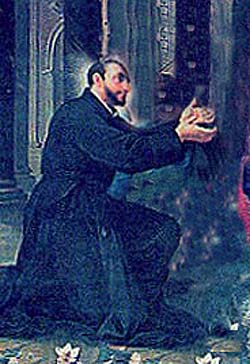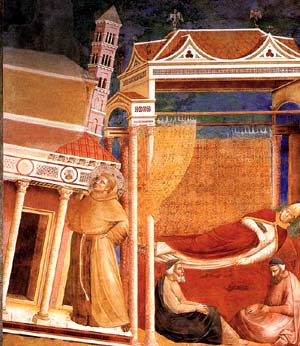 |
The Saint of the Day
St. Cajetan of Thiene, August 7
Prof. Plinio Corrêa de Oliveira
Biographical selection:
St. Cajetan (1480-1547), confessor, was born of a noble family at Thiene in Northern Italy. He was co-founder of the Congregation of the Theatines, a religious institution established to promote the Catholic Reformation. Inspired by a singular confidence in God, he determined that his religious should live exclusively by means of spontaneous alms.
Comments of Prof. Plinio:
Regarding St. Cajetan of Thiene, there is something interesting to remember. We know that one of the causes of the decadence of the Middle Ages was the decadence of the clergy, caused by their unbalanced attachment to wealth. The clergy had become extremely rich and attached to their luxurious lifestyle. They assumed a life of pride and human grandeur.

St. Cajetan founded the Theatines to restore balance to riches and poverty |
Now, according to the Catholic spirit, Bishops and Cardinals should have the material conditions for a distinguished lifestyle to signify their elevated dignity. They are ecclesiastical princes and merit this. In Germany a Bishop was called “His Spiritual Highness.” This is good and legitimate: it is correct to address a Prelate like this, and it is good that he should have a high status. But it is one thing to have what is necessary to sustain the dignity of the position; it is another to be attached to the material goods that accompany such status. This attachment is bad.
Instead of considering their material pomp and riches as something due to the glory of God, many Prelates presumed them as their personal due, using them for the prestige of themselves and their families. The material splendor that was meant to edify the people became an occasion to reflect the egotism of the Prelates. The bad example given by such Bishops and Abbots was followed by the rest of the clergy and religious men and women. This attachment of the clergy to material goods generated the lack of vigilance and combativeness against pride and sensuality, the passions that gave rise to the Revolution. The clergy almost ceased to combat these passions.
To remedy that situation, God called a religious family to renew the ideal of poverty. As always happens with the Holy Ghost, when He renews, He improves. So, the ideal of poverty was reinstalled in the Church. It was like a flame of fire in the wind fighting to stay alight. And when the wind stopped blowing, one could see that the flame had become greater and stronger than it was before the storm. The Holy Ghost called St. Cajetan of Thiene to bring to the Church an even greater and stronger example of poverty than the Franciscan model. With him poverty reached its ultimate limits.

In a dream Pope Innocent III saw St. Francis of Assisi supporting Church through his practice of poverty |
To offer the example of how a religious should not be attached to material goods, St. Cajetan went even further than St. Francis of Assisi. The latter recommended his religious to live from the alms they received, but the Franciscans could ask for alms. St. Cajetan also wanted his religious to live by alms, but he forbade them to ask for them. The gifts had to come voluntarily from the people.
When the Theatines needed something, they could not ask for it, but had to remain as they were until someone came of his own volition to supply the need. You can see that this is the ideal of poverty carried to its very limits. Such a person lives completely dependent on the Providence of God, and nothing else.
The religious family of the Theatines was a bright light that shone in the Church and accomplished its historical mission. In many senses the equilibrium between pomp and poverty was reestablished.
What is the lesson for us? Divine Providence always calls someone to counter-attack the evil that is afflicting the Church and Christendom. Today the great scourge chastising the Church and Christendom is the Revolution. The Revolution in the Church is called Progressivism; in the temporal sphere it is called Communism, Self-managing Socialism and Tribalism. Therefore, there should be some Catholics who are specially called to take the Counter-Revolution to its furthest limits. We are called to be these Catholics.
What does this mean? It means to have a great love for the spirit of hierarchy, discipline, and order. To love the order that God put in the universe, which is at the same time unified and diverse in a way that expresses His infinite perfection This spirit should be taken to its furthest limits, just as St. Cajetan of Thiene brought poverty to its unimaginable limits.


  | | Prof. Plinio Corrêa de Oliveira | |
The Saint of the Day features highlights from the lives of saints based on comments made by the late Prof. Plinio Corrêa de Oliveira. Following the example of St. John Bosco who used to make similar talks for the boys of his College, each evening it was Prof. Plinio’s custom to make a short commentary on the lives of the next day’s saint in a meeting for youth in order to encourage them in the practice of virtue and love for the Catholic Church. TIA thought that its readers could profit from these valuable commentaries.
The texts of both the biographical data and the comments come from personal notes taken by Atila S. Guimarães from 1964 to 1995. Given the fact that the source is a personal notebook, it is possible that at times the biographic notes transcribed here will not rigorously follow the original text read by Prof. Plinio. The commentaries have also been adapted and translated for TIA’s site.
|
Saint of the Day | Home | Books | CDs | Search | Contact Us | Donate

© 2002- Tradition in Action, Inc. All Rights Reserved
|
 |

|